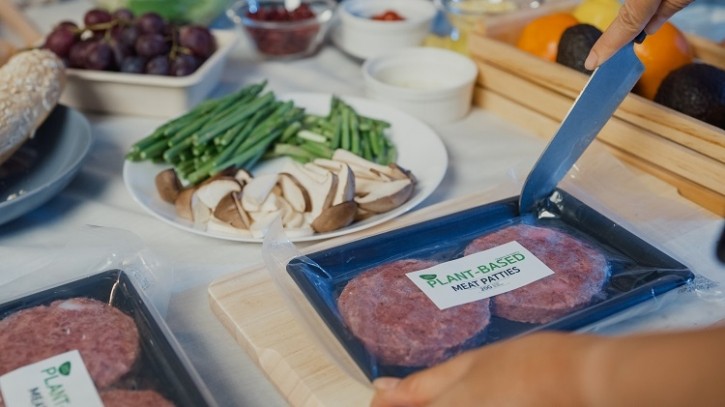Producers boost plant-based meat’s nutritional value

Climate change, food insecurity, antimicrobial resistance and pandemic risk all place an increasing burden on European health systems and economies. And as governments turn to progressive solutions that help public and planetary health, plant-based production continues to grow as a crucial tenet of their plans.
Food producers are responding with new product launches and nutrient-rich formulations to support health and environmental actions. A new report by the Good Food Institute (GFI) Europe explores the nutritional quality of plant-based meat.
In the report, the non-profit organisation promoting plant- and cell-based alternatives to animal products details how plant-based meat can help tackle some of Europe’s most significant public health problems and how businesses and researchers are working to enhance the benefits of meat-mimicking manufacturing with diversified offerings.
The health benefits of plant-based meat
Evidence suggests plant-based meat is an important source of fibre and protein and contains significantly less saturated fat than animal products, the report details.
Initial studies suggest replacing conventional meat with plant-based alternatives could reduce the risk of heart disease, the leading cause of death in Europe; lower the risk of bowel cancer, the second largest cause of cancer death in Europe; improve gut health; and help maintain a healthy weight.
“Helping consumers make a transition toward eating less meat is probably the most important challenge facing the global food system, and there is little doubt that plant-based meat products have an important part to play in helping consumers make that shift,” Anthony Warner, Food scientist, chef and author, who reviewed GFI’s report, said.
Should micronutrients be added?
European efforts to accelerate new plant-based meat development focus on formulating next-generation products with a strong focus on health. In Europe, consumers lack vital nutrients in their diets, affecting their overall health and wellbeing.
“We have to be open, honest and responsible when it comes to the nutritional quality of these products, ensuring they are as healthy and delicious as they can be,” added Warner. “Although a lot of progress has already been made, there is still a good deal more that can be done, and this is perhaps the most important frontier for chefs and product developers working to improve the food system,” says Warner.
To appeal to consumers’ emphasis on health consciousness, manufacturers are adding micronutrients such as B12 and iron to their plant-based meat items. With the emergence of new manufacturing techniques to boost the nutritional profile of plant-based foods, manufacturers can answer consumers’ health demands through enhanced nutrient-specific formulations.
Vitamin B12 is one of the leading micronutrient formulators are adding to their plant-based meat developments. Particular bacteria that typically live in the soil or the digestive systems of certain animals produce Vitamin B12. Iron is also a key micronutrient producers are adding to their formulations, especially as iron deficiency is common in consumers’ diets. Calcium, Omega-3s, zinc and iodine are among the other nutrients European diets often lack, and producers are adding to their new food launches.
Spanish company Heura makes a variety of plant-based meats, from chorizo to chicken, and focuses on clean-label ingredients. Their plain chicken pieces contain water, soy protein, olive oil, vitamin B12 and seasoning. New patent-pending technology announced by the company in early 2023 hopes to build on this further, allowing the company to expand to more challenging whole-cut products.
Swiss company Planted also makes nutritious, clean-label, plant-based meat. Planted’s original chicken pieces contain five ingredients: water, pea protein, pea fibre, rapeseed oil and vitamin B12.
Fortification: Opportunities and obstacles
Due to the plant-based meat production process, important nutrients can be added and improve bioavailability, making it easier for the body to process. A fortification process using essential nutrients offers many opportunities in the plant-based sector. However, barriers to fortification include cost, the sector’s inability to certify fortified food as organic except meat from animals fed the same fortification, and an increasing focus on short ingredient lists that do not include the benefits of added content such as fortification.
GFI’s report relayed that fortification rates vary between European countries, with studies suggesting rates in the UK(2021) and Sweden (2022) were considerably lower than in the Netherlands (2023). The Netherlands’ National Nutrition Centre endorses plant-based meat that meets specific nutrition criteria, including fortification.
Today, the majority of B12 in European diets comes from fortification, either in direct ways through bread and cereals or via injections or fortified feed given to farmed animals, the report highlighted. Branded products by companies including Vegetarian Butcher, Heura, Planted and THIS that include B12 are available in European supermarkets.
Iron contains the anti-nutrient phytic acid, limiting its bioavailability in plant sources. Plant-based meat, however, may offer opportunities to increase iron bioavailability, which, along with fortifications, provides the potential to improve iron accessibility in consumers’ diets.
Pursuing plant-based progress
To advance and diversify plant-based meat applications, the GFI report urges the sector to continue exploring ways to enhance nutritional composition, such as fortification and salt reduction, and to strive to communicate their products’ health benefits to consumers better.
Next-generation plant-based meat development is crucial to optimise nutrient bioavailability and taste, GFI stated, recommending governments and funding bodies invest in this to progress research. In addition, it urges leaders to diversify ingredient crops and expand breeding for plant-based meat applications.
Together, these are expected to increase raw ingredients’ functionality and nutritional value, decrease the need for processing and additional ingredients, boost local production, and advance novel processing technologies including fermentation that can support or improve raw ingredients’ nutritional value.
Furthermore, these efforts will support high-quality trials examining how swapping conventional meat for plant-based alternatives impacts consumers’ health, the report stated. In turn, this will strengthen the scientific foundations behind plant-based meat’s role in public health.























